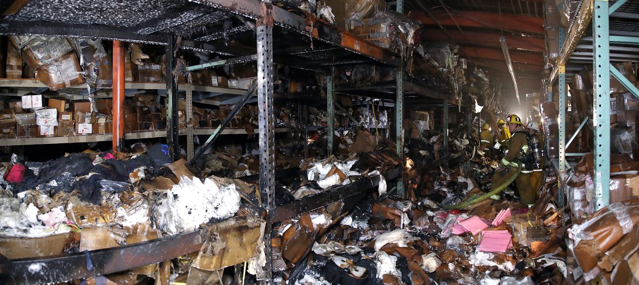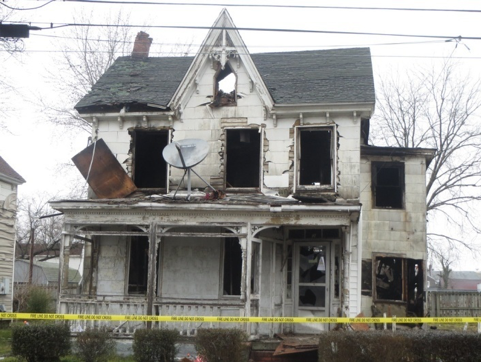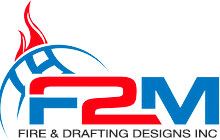What are the Differences in Commercial & Residential Fire Sprinkler Systems?
Commercial & Residential fire sprinkler systems have a few key differences which we will discuss in this article. The primary use of fire sprinkler systems is to extinguish and restrict the spread of fires in a commercial, industrial, or residential space. Inexperienced building owners, either commercial or residential, make the mistake of assuming that all fire sprinkler systems are the same. They also presume that the application of every fire sprinkler system is the same for any type of building.

(Source)
This misconception leads building owners to choose the wrong types of fire sprinklers and suppression systems. Often, this leads to major losses and damage. Let’s go over the differences between them, starting with commercial fire sprinkler systems.
Commercial Fire Sprinkler System
In the event that a fire spreads through the property, commercial fire sprinkler systems prevent extensive fire damages in offices and public spaces. These systems restrict the spread of fire and reduce the smoke, allowing workers to exit the space safely until the fire department services arrive. Some of the types of commercial fire systems are below.
4 Types of Commercial Fire Sprinkler System
- Dry Pipe
This type of fire sprinkler and suppression system includes pipes containing pressurized nitrogen or air. When the fire sprinkler head activates, it releases air. This triggers the discharge of water from the sprinkler heads, which suppresses the fire and restricts the spread.
These are costly and need consistent maintenance, but they are suitable for cold climates as well. Because the pipes in this system contain pressurized air, the chances of water freezing are low.
- Wet Pipe
Cheap and low-maintenance wet pipe fire sprinklers systems are traditional. These pipes contain water, and when the alarm rings, they release pressurized water through each sprinkler head independently.
- Pre-Action
When a smoke or heat detector sends the signal, the pre-action valve opens, allowing water to flow into fire sprinkler pipes. Then, each sprinkler head discharges water. This is a good option when it comes to false alarms. They offer protection from unnecessary water damage.
- Deluge
All sprinkler heads are open in this fire sprinkler system. Upon external heat detection, the water flows through all the sprinkler heads. Applications for this type includes commercial places that involve highly combustible and flammable material and practices in daily operations.
Benefits of Fire Sprinkler Systems in Commercial Buildings
Commercial fire sprinkler systems are a requirement in some states. Therefore, it is necessary for building owners to install and maintain fire sprinkler systems in offices and workplaces. They offer numerous benefits to commercial buildings.
- Assets and corporate property safety
- less long-term corporate expenses
- safe and confident work staff and employees
- control on the spread of fires in emergencies
Residential Fire Sprinkler Systems
Residential fire sprinkler systems have the same purpose as the ones in commercial buildings. The fire sprinkler systems may even be the same in some aspects. Nevertheless, there are relative differences in commercial and residential fire sprinkler systems.

(Source)
Sometimes, homeowners install and maintain fire sprinkler systems to benefits home insurance premiums. This is because the house becomes less susceptible to damage or accidents. Thus, insurance coverage allows low premiums. These are “insurance discounts,” and commercial building owners receive them as well.
Sometimes, fire sprinkler installation takes place during construction. But if a house requires fire sprinkler systems post-construction, the concept of “retrofitting” emerges. Everyone living in the house or apartment feels safe. This also makes you a responsible homeowner or landlord to your tenants or family.
Major Differences in Commercial & Residential Fire Sprinkler Systems
In the US, NFPA Codes and Regulations vary for commercial and residential buildings. Therefore, fire sprinkler systems comply with specific rules and codes in both types of buildings. The design of commercial and residential-level fire safety systems varies as well.
A commercial fire sprinkler system will have the design and installation to prevent fire damage and risks according to space. For example, restaurants, offices, warehouses, shops will have risk assessments for fire emergencies. This usually allows the proper employment of resources to control fire in such commercial spaces.
Nevertheless, residential fire sprinkler systems are similar to each other. Contrary to the large commercial spaces, small households have smaller fire sprinkler systems.
The costs of fire sprinkler systems in commercial and residential spaces also significantly varies.
Differences in Commercial & Residential Fire Sprinkler Systems: Conclusion
When designing a fire sprinkler system for your new project, the differences between residential and commercial fire sprinkler systems will play a major role. F2M Fire & Drafting Designs creates custom fire suppression system designs using state of the art technology and the most modern techniques. All designs are gold standard code compliant, and they licensed across the USA in many states.
Give us a call at (718) 928-3009 to inquire further or email us at info@f2mfadds.com.
Visit our main website for more information: https://www.f2mfadds.com/
References & Related Links:

[…] residential fire sprinkler system comprises a water supply, a suitable water distribution system, and an adequate water delivery […]
[…] most people confuse it with a “fire suppression system.” Both refer to active fire protection systems, but that doesn’t mean they can be used […]